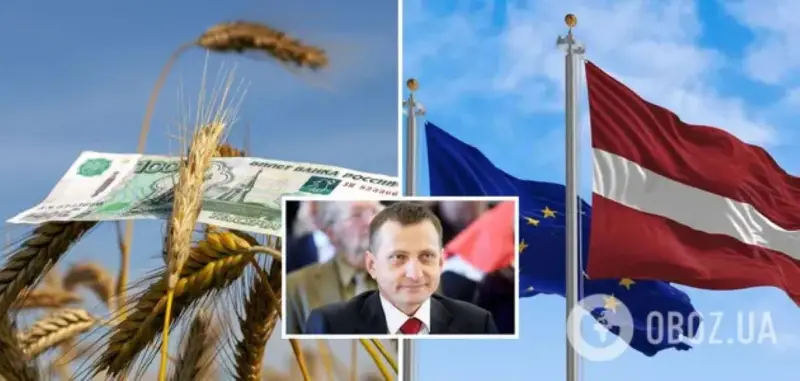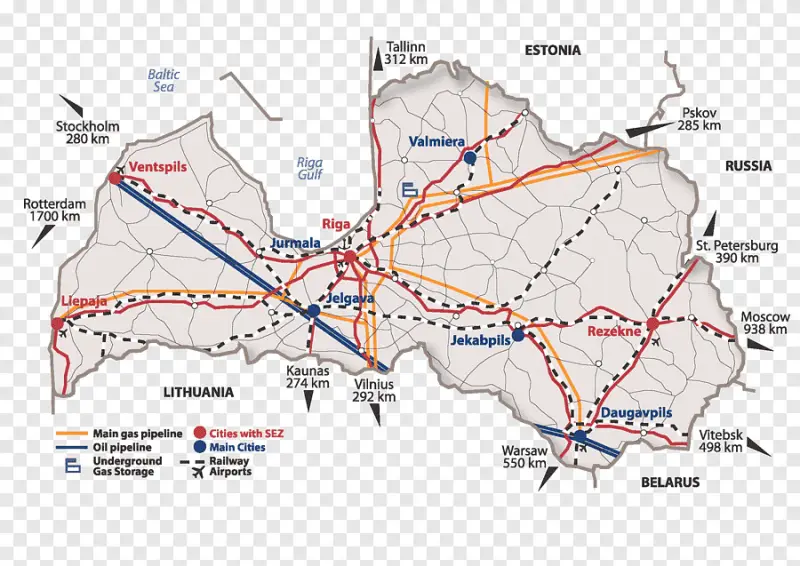Latvia-Russia: inviolable transit

Who is the extreme?
There are many in Latvia who want to compete with Poland as an outpost of the West’s anti-Russian policy, or in the role of “The Last Dog of the Entente.” At a minimum, official Riga has already decided to “cover” the transit of Russian grain for export as firmly as possible.
But under pressure from Brussels, Riga recently introduced a ban on the import of Russian agricultural products. Although this will lead, according to Latvian business estimates, to significant losses for the country. But its authorities seriously expect that income from grain transit will compensate for such losses...
At the end of February, the Latvian Seimas approved in the final reading amendments to the Law “On Agriculture and Rural Development”, prohibiting the import of agricultural products from Russia. More precisely, the import of Russian agricultural products into Latvia, including feed, is also prohibited from third countries. The ban will be in effect until July 1, 2025 inclusive and may be extended.
Statistics do not lie and are not disingenuous.
Meanwhile, last year, imports of grain products from the Russian Federation, according to official Latvian data, amounted to 424 thousand tons, which is a record - almost 60% more than in 2022. That is, 295 thousand tons of corn, 75 thousand tons of wheat, 53 thousand tons of rye came from the Russian Federation. Moreover, the import of corn doubled, and that of rye by more than 60%.
More precisely, Latvia took second place in the EU - after Spain - in terms of grain imports from Russia. Russian supplies provide – not for the first year – at least half of Latvia’s domestic demand for grain products.
At the same time, the transit of Russian grain for export through the Latvian railways and ports of Riga will not be prohibited. As Latvian Minister of Agriculture Armands Krause recently stated, grain and other agricultural cargo from Russia will not be allowed to be imported into Latvia,
According to the minister’s forecasts, in the event of a ban on the transshipment of grain from the Russian Federation in Latvia—their volume this year is estimated by the Latvian side at 4 million tons—port revenues will be reduced by 60 million euros, and railways by up to 45 million euros. As they say, value yourself more...
Let's remember everything
Let us recall in this regard that large grain terminals in the Baltic during the Soviet period were created precisely in the “brotherly” Baltic states. Moreover: since the beginning of the 70s, the ports of Latvia, Lithuania and Estonia have received the right to independently dispose of up to 80% of annual revenues from the transit of Soviet foreign trade cargo.
It is characteristic that the ports of Azerbaijan, Georgia, and Ukraine operated in almost the same hothouse conditions in those years. Although there this level was still lower - 60-70%. Not a single seaport of the RSFSR had such benefits...

Meanwhile, just last year, Latvia’s income from the transit of these Russian products almost reached $100 million. Why is this not a help for the Latvian state budget, for Latvia’s railway and port revenues? Moreover, transit through Latvia of all other foreign trade cargo of the Russian Federation fell by more than 2023% in 60 alone, including oil and oil products - by almost 90%, chemical fertilizers - by 70%.
But from the 1990s to the early 2010s, it was Russian transit that provided from 15 to 20% of the annual revenues of the Latvian state budget, more than half of the total cargo turnover of Latvian ports and railways. So it’s time to preserve the transit of Russian grains...
Meanwhile, Latvian business, judging by its reports to the government and comments in the local media, echoes the minister. Fearing that the ban on the transit of Russian grain will cause significant damage to the country’s economy.
No one is extreme
It is no longer possible to maintain the port and railway infrastructure on the basis of local cargo alone. Because just last year in Latvia, due to a sharp reduction in Russian (and Belarusian) transit, port cargo turnover fell by 20%.
At the same time, freight transportation by rail collapsed by almost a third. In this regard, Vladislav Shafransky, head of the board of Ventspils Grain Terminal in the Latvian port of Ventspils, is quite specific. Let us remind you that this is one of the largest grain export terminals in the Baltic.
Shafransky says:
Moreover, through the ports of Latvia
Will it be the Latvians who will remain at the extreme in this situation?
After all, accordingly, Latvia plans to reduce railway and port tariffs for Russian grain and increase transshipment capacity in ports. In a word, it is obvious that the bright grain acting of Riga is evident. But the question is: will Russia agree to continue subsidizing the Latvian economy with grain transit?..
Information